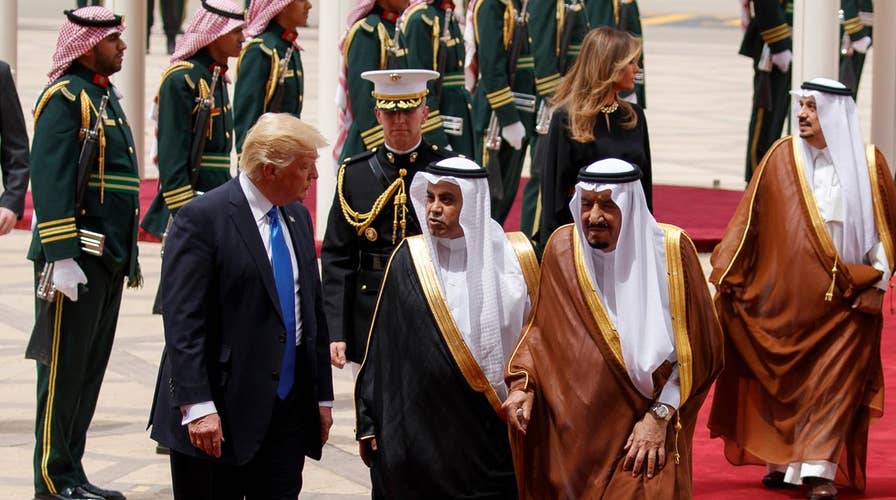President Trump formally greeted in Saudi Arabia
President arrives in Saudi Arabia on first stop of overseas trip
President Trump in Saudi Arabia on Saturday signed a nearly $110 billion arms deal to help the Persian Gulf ally with its military-defense system.
"That was a tremendous day," Trump said after signing the deal with Saudi leader King Salman. "Tremendous investments in the United States. Hundreds of billions of dollars of investments into the United States and jobs, jobs, jobs."
The White House says the package includes defense equipment and other support to help the Arab nation and the rest of the Gulf region fight again terrorism and the threat of a nuclear-armed Iran, according to the White House.
Trump during his winning presidential campaign and in the first several months of his presidency has argued the United States can no longer be the world’s police officer and that other nations must become more self-sufficient in efforts to combat terrorism and in protecting themselves against rogue nations like Iran and North Korea.
Trump arrived in Saudi Arabia early Saturday as the start to his nine-day, overseas tour that will also take him to Israel and Europe. The international trip is Trump’s first since taking office in January.
“Great to be in Riyadh, Saudi Arabia,” Trump tweeted upon landing in Air Force One. “Looking forward to the afternoon and evening ahead.”
Trump is expected to pledge his respect and support to Saudi leaders and to the region, after months of harsh anti-Muslim rhetoric.
Trump greeted at the Saudi airport with an elaborate ceremony, punctuated by a military flyover and a handshake from Saudi King Salman.
First lady Melania Trump wore a black pantsuit with a golden belt and did not cover her head for the arrival, consistent with custom for foreign dignitaries visiting Saudi Arabia.
In 2015, her husband had, in a tweet, criticized former first lady Michelle Obama for not wearing a headscarf during a visit to the kingdom.
After two days of meetings in Riyadh, Trump will travel to Israel, have an audience with Pope Francis at the Vatican, then meet with allies at a NATO summit in Brussels and the Group of 7 wealthy nations in Sicily.
The multi-billion dollar defense deal “in the clearest terms possible” shows the United States’ commitment to Saudi Arabia and other Gulf partners and expands economic opportunities, the White House said. The deal will also supporting tens-of-thousands of new jobs in the U.S. defense industrial base, the White House also said.
The package includes tanks, combat ships, missile defense systems, radar and communications and cybersecurity technology.
The 81-year-old King Salman greeted Trump at the airport. The two leaders exchanged pleasantries and Trump said it was "a great honor" to be there.
Several jets then flew overhead leaving a red, white and blue trail.
Saudi Arabia offered Trump the elaborate welcome ahead of his two-day stay. Billboards featuring images of Trump and the king dotted the highways of Riyadh, emblazoned with the motto "Together we prevail."
Trump's luxury hotel was bathed in red, white and blue lights and, at times, an image of the president's face.
Trump and the king met briefly in the airport terminal for a coffee ceremony before the president headed to his hotel before the day's other meetings.
White House Chief of Staff Reince Priebus told reporters on Air Force One that Trump spent the flight meeting with staff, working on his upcoming speech to the Muslim world and getting a little sleep.
White House officials hope the trip gives Trump the opportunity to recalibrate after one of the most difficult stretches of his young presidency. The White House badly bungled the president's stunning firing of FBI Director James Comey, who was overseeing the federal investigation into possible ties between Trump's campaign and Russia. On Wednesday, the Justice Department relented to calls from Democrats to name a special counsel, tapping former FBI chief Robert Mueller to lead the probe.
After spending much of Saturday meeting with King Salman and other members of the royal family, Trump was to end the day at a banquet dinner at the Murabba Palace. On Sunday, he'll hold meetings with more than 50 Arab and Muslim leaders converging on Riyadh for a regional summit focused largely on combating the Islamic State and other extremist groups.
Trump dodged one potential land mine when Sudanese President Omar al-Bashir, who has been indicted on war crime and genocide charges, announced that he would not attend the summit for personal reasons.
The centerpiece of Trump's visit to Saudi Arabia will be a speech Sunday at the Arab-Islamic-American summit. White House aides view the address as a counter to Obama's 2009 speech to the Muslim world, which Trump criticized as too apologetic for U.S. actions in the region.
Trump will call for unity in the fight against radicalism in the Muslim world, casting the challenge as a "battle between good and evil" and urging Arab leaders to "drive out the terrorists from your places of worship," according to a draft of the speech obtained by The Associated Press. The draft notably refrains from mentioning democracy and human rights — topics Arab leaders often view as U.S. moralizing — in favor of the more limited goals of peace and stability.
It also abandons some of the harsh anti-Muslim rhetoric that defined Trump's presidential campaign and does not contain the words "radical Islamic terror," a phrase Trump repeatedly criticized Hillary Clinton for not using during last year's campaign.




